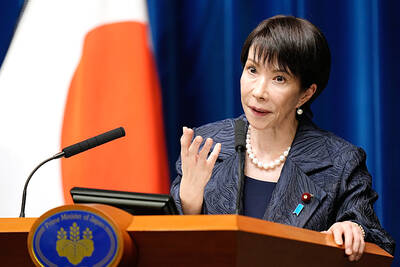Wu Shih-tsai (吳思材), a key suspect in the Papua New Guinea diplomatic fraud scandal, faces two years and four months behind bars after the Taipei District Court found him guilty yesterday on charges of forgery and defamation.
Wu has been in custody since May 6 and will remain so even if he decides to appeal the sentence, which he can do within 10 days of receiving the written verdict.
“Wu is a naturalized Singaporean and he is no longer a Taiwanese national. As a result, there is a fear that he would abscond if released. His detention shall continue,” Taipei District Court spokesman Huang Chun-min (黃俊明) said.
Wu and Ching Chi-ju (金紀玖), the other main suspect in the case, were commissioned in August 2006 by the Ministry of Foreign Affairs and former National Security Council secretary-general Chiou I-jen (邱義仁) to act as intermediaries in an attempt to set up diplomatic relations with Papua New Guinea.
MISSING MONEY
The ministry later agreed to wire US$29.8 million to a bank account that had been opened by Wu and Ching at a branch of OCBC Bank in Singapore. The funds were to be transferred to the Papua New Guinea government once the two nations had signed a diplomatic communique.
Following the failure of the attempt in December 2006, the ministry asked for its money back. But Chin allegedly refused to return the funds and has since disappeared.
FALSIFIED STATEMENTS
Wu, when he returned to Taiwan, falsified bank statements and made up a story that he had been threatened by an unidentified gunman who told him to keep his mouth shut about the case and leave Taiwan as soon as possible.
Chiou, former minister of foreign affairs James Huang (黃志芳) and former deputy minister of national defense Ko Cheng-heng (柯承亨) all resigned over their involvement in the diplomatic scheme.
Ching, who is a US citizen, is believed to be at large in the US.

The Ministry of Foreign Affairs (MOFA) yesterday voiced dissatisfaction with the Comprehensive and Progressive Agreement for Trans- Pacific Partnership (CPTPP), whose latest meeting, concluded earlier the same day, appeared not to address the country’s application. In a statement, MOFA said the CPTPP commission had "once again failed to fairly process Taiwan’s application," attributing the inaction to the bloc’s "succumbing to political pressure," without elaborating. Taiwan submitted its CPTPP application under the name "Separate Customs Territory of Taiwan, Penghu, Kinmen and Matsu" on Sept. 22, 2021 -- less than a week after China

THE GOOD WORD: More than 100 colleges on both sides of the Pacific will work together to bring students to Taiwan so they can learn Mandarin where it is spoken A total of 102 universities from Taiwan and the US are collaborating in a push to promote Taiwan as the first-choice place to learn Mandarin, with seven Mandarin learning centers stood up in the US to train and support teachers, the Foundation for International Cooperation in Higher Education of Taiwan (FICHET) said. At the annual convention of the American Council on the Teaching of Foreign Languages held over the weekend in New Orleans, Louisiana, a Taiwan Pavilion was jointly run by 17 representative teams from the FICHET, the Overseas Community Affairs Council, the Steering Committee for the Test of Proficiency-Huayu, the

A home-style restaurant opened by a Taiwanese woman in Quezon City in Metro Manila has been featured in the first-ever Michelin Guide honoring exceptional restaurants in the Philippines. The restaurant, Fong Wei Wu (豐味屋), was one of 74 eateries to receive a “Michelin Selected” honor in the guide, while one restaurant received two Michelin stars, eight received one star and 25 were awarded a “Bib Gourmand.” The guide, which was limited to restaurants in Metro Manila and Cebu, was published on Oct. 30. In an interview, Feng Wei Wu’s owner and chef, Linda, said that as a restaurateur in her 60s, receiving an

MORE RETALIATION: China would adopt a long-term pressure strategy to prevent other countries or future prime ministers following in Sanae Takaichi’s steps, an academic said Taiwan should maintain communications with Japan, as Japanese Prime Minister Sanae Takaichi is to lead a revision of security documents, Taiwanese academics said yesterday. Tensions have risen between Japan and China over remarks by Takaichi earlier this month that the use of force against Taiwan would constitute a “survival-threatening situation” for Japan. Prospect Foundation president Lai I-chung (賴怡忠) yesterday said Takaichi’s stance regarding Taiwan is the same as past Japanese prime ministers, but her position is clearer than that of her predecessors Fumio Kishida and Shigeru Ishiba. Although Japan views a “Taiwan contingency” as a “survival-threatening situation,” which would allow its military to